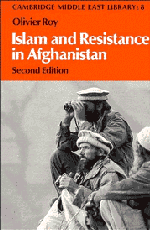Book contents
- Frontmatter
- Contents
- Acknowledgements
- Maps
- Introduction
- 1 State and society in Afghanistan
- 2 Islam in Afghanistan
- 3 The origins of Afghan fundamentalism and popular movements up to 1947
- 4 The Islamist movement up to 1978
- 5 The communist reforms and the repression, 1978–9
- 6 The uprisings, 1978–9
- 7 The establishments of political parties
- 8 The development of the parties between 1980 and 1984
- 9 The role of the Shiʿa in the resistance
- 10 Society and the war
- 11 From freedom fighter to guerilla
- 12 Military operations
- 13 The conflict from 1986 to the Soviet withdrawal
- 14 Cultural patterns and changes in society: an assessment
- 15 Afghan politics and the outside world
- Appendixes
- 1 The resistance parties
- 2 Glossary
- 3 Chronological table
- Notes
- Bibliography
- Index
3 - Chronological table
- Frontmatter
- Contents
- Acknowledgements
- Maps
- Introduction
- 1 State and society in Afghanistan
- 2 Islam in Afghanistan
- 3 The origins of Afghan fundamentalism and popular movements up to 1947
- 4 The Islamist movement up to 1978
- 5 The communist reforms and the repression, 1978–9
- 6 The uprisings, 1978–9
- 7 The establishments of political parties
- 8 The development of the parties between 1980 and 1984
- 9 The role of the Shiʿa in the resistance
- 10 Society and the war
- 11 From freedom fighter to guerilla
- 12 Military operations
- 13 The conflict from 1986 to the Soviet withdrawal
- 14 Cultural patterns and changes in society: an assessment
- 15 Afghan politics and the outside world
- Appendixes
- 1 The resistance parties
- 2 Glossary
- 3 Chronological table
- Notes
- Bibliography
- Index
Summary
1747: victoryof the Durrani tribal federation led by Ahmad Shah of the Saddozay clan of the Popalzay tribe. He founded a Durrani empire which stretched as far as India
1761: victory of Panipat against the Marathes
1773–1793: reign of Timur Shah
1793–1799: reign of Zaman Shah
1803–1809: reign of Shah Shujaʿ
1809: British delegation to Peshawar led by Mountstuart Elphinstone
1809–1818: reign of Mahmud
1818–1835: civil war
1835–1863: reign of Dost Muhammad
1839–1842: first Anglo-Afghan war, the interregnum of Shah Shujaʿ
1856: the Persians take Heart
1863–1879: the reign of Shir ʿAli
1878: the second Anglo-Afghan war
1879: Treaty of Gandamak signed by Yaqub Khan, which included the agreement that a British representative should be installed at Kabul
1880: the British recognise Abdurrahman as Amir
1880: British defeat at Maywand
1885: occupation of the Panjdih oasis by the Russians
1887: Russo-Afghan agreement on the northern frontier of Afghanistan
1893: Durand agreement on the eastern frontier of Afghanistan
1901: death of Abdurrahman. His son Habibullah becomes Amir
1911: the founding of the modernist journal Siraj ul-Akhbar by Mahmud Tarzi
- Type
- Chapter
- Information
- Islam and Resistance in Afghanistan , pp. 246 - 247Publisher: Cambridge University PressPrint publication year: 1990

